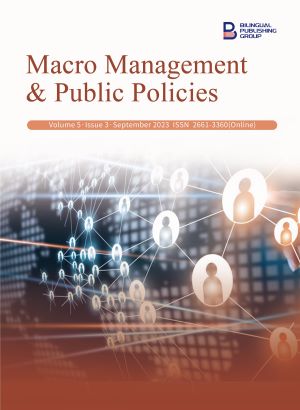-
1046
-
388
-
266
-
247
-
231
The Impact of Trade Deficits and the Burden of Crisis Oriented Economy on the Livelihoods of Nepali People
DOI:
https://doi.org/10.30564/mmpp.v5i3.5760Abstract
29,164,578 people are living in Nepal. Out of them, 48.96% are men and 51.04% are women. The growth rate of the population is 0.93% annually. However, 216,957 individuals had been abroad for employment, education or other reasons. It has developed an addiction to imported products using remittances. The government delays spending the money allotted for capital improvements. The debt incurred by loans received from donors exceeds between 20 trillion and 80 billion of Nepal’s entire yearly budget. Based on statistics from Nepal Rastra Bank fiscal years 2021/2022, export and import contributions to overall Nepal’s foreign commerce were 8.40% and 91.60%, respectively. Due to the burden of debt and increasing trade deficit in the Nepalese economy, it has greatly affected the livelihood of the people. The increase in the prices of goods has made the lives of ordinary and low-income citizens very difficult. To reduce it, it is necessary to increase the production of indigenous products and promote their trade. Nepal needs to improve its ability to balance imports and exports. Economic dependency will reduce and the nation’s focus on self-sufficiency will increase if the market is extended by raising the output of locally produced items. There will be an increase in hazards as the state’s ability to function weakens. No nation can be entirely self-sufficient in the open global market of today by producing all the commodities and services it requires. Economic dependency will reduce and the nation’s focus on self-sufficiency will increase if the market is extended by raising the output of locally produced items. There will be an increase in hazards as the state’s ability to function weakens.
Keywords:
Import; Export; Domestic product; Raw materials; Trade deficit; Production and consumptionReferences
[1] Report of National Population and Housing Census [Internet]. NPHC; 2021. Available from: https://censusnepal.cbs.gov.np/results
[2] Constitution of Nepal [Internet]. Available from: https://lawcommission.gov.np/en/wp-content/uploads/2021/01/Constitution-of-Nepal.pdf
[3] A Statistics of foreign trade of Nepal 2022: Report published by department of custom, ministry of finance, Kathmandu.
[4] Budget Speech 2021/22 [Internet]. Government of Nepal. Available from: https://www.mof.gov.np/site/publication-detail/3064
[5] Bhoosal, Y.L., Byanjankar, R., 2022. An Empirical Study On The Determinants Of Government Revenue In Nepal [Internet]. Available from: https://www.nrb.org.np/er-article/an-empirical-study-on-the-determinants-of-government-revenue-in-nepal/
[6] Foreign Investment and Technology Transfer Act, 1992 [Internet]. Available from: https://cn.nepalembassy.gov.np/wp-content/uploads/2017/11/foreign-investment-and-technology-transfer-act-2049-1992.pdf
[7] Annual Report of Nepal Electricity Authority [Internet]. NEA. Available from: https://www.nea.org.np/annual_report
[8] The Global Risks Report 2022 [Internet]. WEF; 2022. Available from: https://www3.weforum.org/docs/WEF_The_Global_Risks_Report_2022.pdf
[9] Statistical Information on Nepalese Agriculture [Internet]. SAD; 2021. Available from: https://moald.gov.np/wp-content/uploads/2022/07/STATISTICAL-INFORMATION-ON-NEPALESE-AGRICULTURE-2077-78.pdf
[10] The Innovation Imperative for Developing East Asia. World Bank East Asia and Pacific Regional Report [Internet]. World Bank; 2021. Available from: https://openknowledge.worldbank.org/entities/publication/3e82eb68-87e1-5307-aaf7-03ab4dd9e2b7
[11] Customs Tariff 2020/2021 [Internet]. Department of Customs; 2021. Available from: https://customs.gov.np/uploads/Pages/1611309259_np.pdf
[12] Foreign Investment Policy [Internet]. Government of Nepal. Available from: http://www.investnepal.gov.np/portal/index.php?p1=content&p2=9
[13] Commercial Trade Policy 2015 [Internet]. Ministry of Commerce. Available from: https://www.fncci.org/ckfinder/userfiles/files/02%20TradePolicy_2015.pdf
[14] Foreign Investment and Technology Transfer Act, 2019 [Internet]. Available from: https://www.lawcommission.gov.np/en/wp-content/uploads/2019/09/The-Foreign-Investment-and-Technology-Transfer-Act-2019-2075.pdf
[15] Public Private Partnership and Investment Act 2019 [Internet]. Available from: https://ibn.gov.np/uploads/documents/public-private-partnership-and-investment-act-ppp-and-investmentact-2019pdf-1483-330-1657605913.pdf
[16] Industrial Statistics (2021/22) [Internet]. Government of Nepal. Available from: https://doind.gov.np/detail/145
Downloads
How to Cite
Issue
Article Type
License
Copyright © 2023 Author(s)

This is an open access article under the Creative Commons Attribution-NonCommercial 4.0 International (CC BY-NC 4.0) License.




 Uttam Khanal
Uttam Khanal

